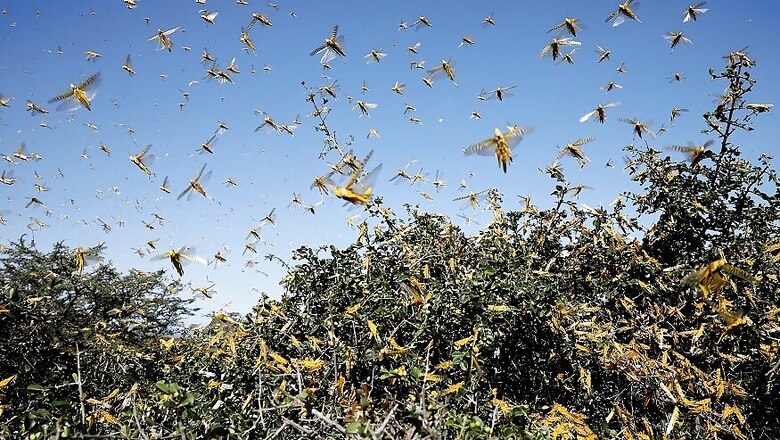
views
The Centre on Friday said locust control operations have been done in 1,32,777 hectare across many states since April 11 and minor crop losses have been reported in some districts of Rajasthan.
In a statement, the Union agriculture ministry said swarms of immature pink locusts and adult yellow locusts were active in some districts in Rajasthan and some areas of Madhya Pradesh.
The locust control operations were carried out in Rajasthan, Madhya Pradesh, Punjab, Gujarat, Uttar Pradesh and Haryana by locust circle offices (LCOs) starting from April 11 till July 2, the ministry said.
"In the intervening night of July 2-3, 2020, control operations were carried out at 19 places in seven districts viz. Jaisalmer, Barmer, Jodhpur, Nagaur, Sikar, Jaipur, and Alwar of Rajasthan state and two places in the Tikamgarh district of Madhya Pradesh by LCOs," it added.
State governments have also been simultaneously carrying out locust control operations, the ministry said.
Till July 2, control operations have been done in 1,13,003 hectare area in Rajasthan, Madhya Pradesh, Punjab, Gujarat, Uttar Pradesh, Maharashtra, Chhattisgarh, Haryana and Bihar by state governments.
Currently, the ministry said 60 control teams with spray vehicles are deputed/ deployed in Rajasthan, Gujarat, Madhya Pradesh and Uttar Pradesh. More than 200 central government personnel are engaged in locust control operations.
Further, five companies with 12 drones are deployed at Barmer, Jaisalmer, Bikaner, Nagaur and Phalodi in Rajasthan for effective control of locusts on tall trees and in inaccessible areas through spraying of pesticides.
"No significant crop losses have been reported in the states of Gujarat, Uttar Pradesh, Madhya Pradesh, Maharashtra, Chhattisgarh, Bihar and Haryana. However, some minor crop losses have been reported in some districts of Rajasthan," the statement said.
On Friday, swarms of immature pink locusts and adult yellow locusts were active in Jaisalmer, Barmer, Jodhpur, Nagaur, Sikar, Jaipur, and Alwar of Rajasthan and Tikamgarh area of Madhya Pradesh.
As per the Food and Agriculture Organisation's Locust Status Update of June 27, swarms from Somalia are likely to migrate to the summer breeding areas along the India-Pakistan border.
"In Pakistan, some swarms have started laying eggs in southeast Sindh near the Indian border while swarms hopper bands are forming in Khyber Pakhtunkhwa. In India, some small groups of immature adults which have moved in eastern parts of Uttar Pradesh are likely to disperse without causing much harm," the statement said.
The weekly virtual meeting on Desert Locust of South-West Asian countries (Afghanistan, India, Iran and Pakistan) is being organised by FAO. 15 virtual meetings of the technical officers of South West Asian countries have taken place so far.


















Comments
0 comment